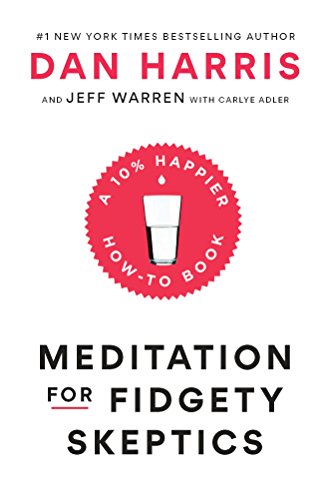I‘m intrigued by meditation. I say that having never done it. But I’m eager to get started.
There are different kinds of meditation but the one I’m most interested in, having recently “read” about it, is mindful meditation. The goal of this form – though you ought to listen to the book yourself – is to become more mindful of the thing you’re doing right now. Everything – tying your shoe, preparing breakfast, talking with a friend, walking the dog, driving a car, enjoying music, swimming, falling asleep, crafting a blog post! The opposite of mindfulness is mindlessness, which, if left unchecked, at least for many people, leads to a kind of noisy experience of reality, one that reflexively reacts to the onslaught of raw sensory inputs (e.g., Facebook likes) instead of pausing to interact with your atomic experiences in thoughtful way, with full clarity of mind. At least that’s how I understand it. Regular, mindful meditation isn’t the only way of reducing mindlessness in our lives, in turn making us measurably happier with ourselves and others, but it is one proven way of doing so (there’s some decent emerging science around this).
Mindful meditation (performed daily) is an exercise for the brain that produces wellness benefits analogous to those that exercise has on our muscles. Different tissues, same approach. And like physical exercise, the wellness benefit is roughly proportional to the amount of time spent doing it (although, not unlike drugs, there’s probably an upper limit). Benefits include increased calmness of temper, clarity and rationality, greater feelings of fulfillment, less arguing with your spouse, heightened feelings of gratefulness, and, yes, that ultimate goal of so many self help books du jour – increased Happiness.
 The author, Dan Harris, whose previous book is ten percent happier, is wryly self-deprecating in the way he dispels the cynical reaction many firstcomers to meditation have – that it’s something for Hare Krishna types who enjoy humbling themselves in fleece shawls while seated cross-legged gazing at their navels for hours on end. It’s not that at all. The approach is super practical, and the book is a kind of manual for beginning meditators, infused with too few (if you ask me) hilarious anecdotes from Dan’s personal experience with meditation and his interactions with fidgety skeptics. Nevertheless, there’s enough practical seriousness here to keep you from thinking you’re being seduced by the latest self-help gimmickry. In fact, mindful meditation, unlike, say, Mantra meditation (as practiced by real Hare Krishna types) is a purely secular exercise of the mind. It’s not an escape from reality; the practice is a deep dive embrace of the voices in our head, identifying them, accepting them, welcoming them to the party, diminishing their control over us, and in doing so diluting (not eliminating) their interference of a life-improving mindful experience. As one of Dan’s close friends and coauthors emphasizes (himself a mindful meditation expert) – a committed practice of mindful meditation will make you more equanimous. No drug I’m aware of is going to do that for you. And there’s no prescription required.
The author, Dan Harris, whose previous book is ten percent happier, is wryly self-deprecating in the way he dispels the cynical reaction many firstcomers to meditation have – that it’s something for Hare Krishna types who enjoy humbling themselves in fleece shawls while seated cross-legged gazing at their navels for hours on end. It’s not that at all. The approach is super practical, and the book is a kind of manual for beginning meditators, infused with too few (if you ask me) hilarious anecdotes from Dan’s personal experience with meditation and his interactions with fidgety skeptics. Nevertheless, there’s enough practical seriousness here to keep you from thinking you’re being seduced by the latest self-help gimmickry. In fact, mindful meditation, unlike, say, Mantra meditation (as practiced by real Hare Krishna types) is a purely secular exercise of the mind. It’s not an escape from reality; the practice is a deep dive embrace of the voices in our head, identifying them, accepting them, welcoming them to the party, diminishing their control over us, and in doing so diluting (not eliminating) their interference of a life-improving mindful experience. As one of Dan’s close friends and coauthors emphasizes (himself a mindful meditation expert) – a committed practice of mindful meditation will make you more equanimous. No drug I’m aware of is going to do that for you. And there’s no prescription required.
